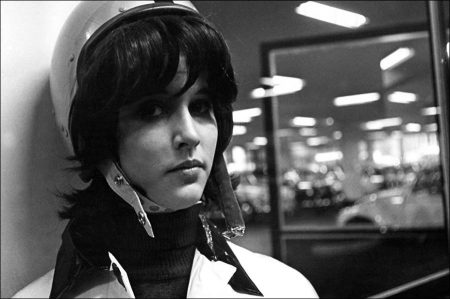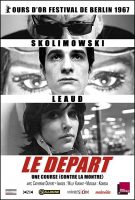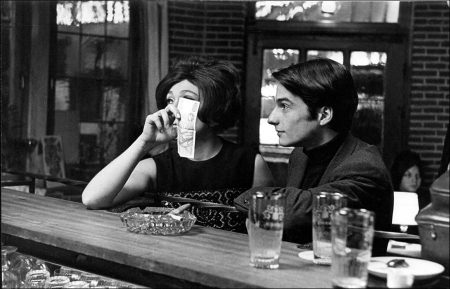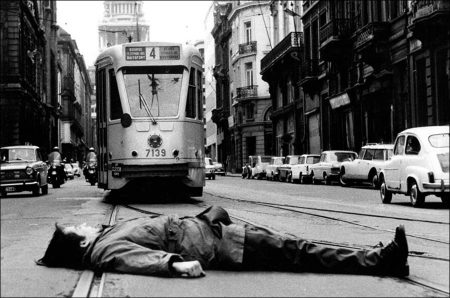The Departure movie storyline. Marc is a young hairdresser in Brussels who is crazy about cars. Hoping his boss will lend him his Porsche 911S, he has entered for a rally. However, his boss says he is using the car that weekend. After failing to con a dealer into a loan, he decides to sell everything he has. In the process he meets an attractive girl called Michèle, who supports his plan, and the two end up shut inside the Brussels Motor Show for the night.
His next idea is to approach a client of the salon, a rich older woman who has a Porsche, and try to charm it from her. Finding her at a catwalk show of bikinis, she takes him into her car and fellates him. Abandoning that line of attack, he learns that he cannot rent a car because he is too young and then he fails to steal one in the street. When telling Michèle that all avenues seem closed, his boss returns and says he can have the Porsche for the weekend after all.

At the hotel by the starting line, he finds they can only afford one room, so he disguises himself as a girl and goes up with Michèle. They talk late and fall asleep on the bed. In the morning, cars are revving up for the start but the two have overslept. Emerging from the bathroom, Marc pulls the bedding off Michèle to find that she is naked and waiting for him. The film ends at that moment, leaving viewers to assume that Marc is going to find a relationship with Michèle more rewarding than rallying.
The Departure (French: Le Départ) is a 1967 Belgian comedy film directed by Jerzy Skolimowski. It stars Jean-Pierre Léaud as a car-obsessed young man trying to get possession of a Porsche for a race. The film won the Golden Bear at the 17th Berlin International Film Festival. The film was also selected as the Belgian entry for the Best Foreign Language Film at the 40th Academy Awards, but was not accepted as a nominee.
Film Review for The Departure
More and more we are assailed by the feeling: our youth is but a brief night (fill it with rapture!); it will be followed by grand “experience”, the years of compromise, impoverishment of ideas, and lack of energy. Such is life. That is what adults tell us, and it is what they experienced (…) But [the philistine] has never grasped that there exists something other than experience, and that there are values – inexperienceable – which we serve. – Walter Benjamin, 1913, age 18
Youth is better left unexplained. Just think: what are the most memorable elements in any youth or JD [juvenile delinquent] film? Their capacity for outlining the social dilemma of youth? No! It’s all the sex, swearing, violence and action – those bits where youth is at its most reckless and disconnected from social and family ties. Youth these days is so grown-up it’s painful! – Philip Brophy, 1988, age 29
You know the cinephile game that consists of proclaiming, ridiculously but passionately: “Cinema is Rio Bravo, is Le Mépris, is Viaggio in Italia, is Gertrud, is Eyes Wide Shut”… ? Well, now I, too, can play the game, because cinema for me is, categorically, Jerzy Skolimowski’s Le départ.
John Cale writes about a wild time of his life in his autobiography What’s Welsh for Zen?: “This was something close to cinema. A vicarious, unstable reality”. For me, the vicarious, unstable reality of cinema is concentrated in Jerzy Skolimowski’s Le départ.
Many believe that the French New Wave died in 1964. But the ultimate Nouvelle Vague film was made in 1967 by a Polish director – who couldn’t speak a word of French – in Belgium! How can this extraordinary film count for so little in the annals of post-Nouvelle Vague film history, when it should figure as one of the great culminations of ‘60s cinema? (It does, or did once, happen to be Louis Garrel’s favourite film, as I learnt from some stray fashion magazine.) Long out of circulation, it finally became available on DVD from Malavida Films (France) in 2012.
It is cinema in so many ways: as a city film (about Brussels, hypnotic in all its aspects); as the portrait of a singular young star (Jean-Pierre Léaud) at the paroxysmic height of his histrionic, acting-out verve (and Skolimowski misses no opportunity for a lark, disguise or prank involving him); as surely among the very finest fusions of image, incident and sound in the medium’s history.
It’s a wild, raucous, anarchic testament to youth. Skolimowski – 29 years old in 1967, 3 years out of film school – was himself a disconnected, delinquent Polish youth, obsessed with physical activities such as boxing. He had already shot to international prominence as part of a bright gang that included Roman Polanski and Andrzej Wajda. Before it, an amazing string of his Polish feature productions: Identification Marks: None (1964), Walkover (1965), Barrier (1966). For Le départ, he borrowed two central actors from Jean-Luc Godard’s Masculin féminin (1965): Catherine Duport (as Michèle) – never to be seen again on screen – and the already iconic Léaud (as Marc), still playing his emblematic self today.
In the mirror of his maker, Marc is given no family ties, no job that he truly cares about, no “home” in any genuine sense. He displays an insouciant disrespect for all elders. For Skolimowski, cinema shares in the energy of his confused and immature rebel-heroes. This savage youth is a state that is hard to leave (and many subsequent Skolimowski stories, as he himself ages, will show the difficult passage from sullen sun to troubled father.) Marc even steals food from a baby! And he is always pitted against the animal kingdom, such as a memorably yapping dog.
For Le départ, Skolimowski also borrowed from the ambient Pop Art culture of the ‘60s: a world of media images on screens and posters, consumerism on billboards. Everywhere, the eyes of images look at us … (later to become a paranoid fixation of Jacques Rivette – or his characters, at any rate – in Pont du Nord [1981]).
But it’s also a romantic comedy, and right up there with It Happened One Night (1934) on this plane: from overnight-in-car-boot to hesitant bedroom glances, and the morning of the big race that finds him still there in bed with her – it has the ardent brio (and nervous candour) which the Nouvelle Vague itself rarely if ever achieved, not even in Truffaut (sedate compared to Skolimowski). And what a modern sense of humour: sudden stasis (paralysis) broken by shouts and mad flailing, immediate contradictions (this Porsche freak is a hairdresser by day?), scenes whisked away with nary a backward glance.
Le départ is a film I would gladly live in. The content is apolitical, but the style is totally free. Nothing comes close to it for intensity: the speed (of cars); the music (by Krzysztof Komeda – who died tragically young at 38 in 1969 – with solo sax by Gato Barbieri); the manic gesticulations (by Léaud at his craziest and most physical: see his foundational gesture of running, or his jumping of fences and gates); the energy and élan of the editing and camera movements; and the often destructive, anarchic use of sets and props. (Léaud continued the game with Skolimowski in their subsequent episode of the conceptual anthology Dialog: 20/40/60 [1968]).
Le départ has an improvisatory, make-believe nature. Everything that happens in it is being constantly rebooted, via sudden, wayward story developments. That amazing music truly drives the film – to an extent rarely seen in cinema – with its stop/start rhythms, its noisy discordance, its dreaminess. Entire, complicated passages (bridging many scene and location changes) seem shaped around the dynamics of large cues in this score.
It is a freewheeling comedy of masquerade (Léaud dubbing himself in mock-Indian is a highlight – in fact, the whole film is, I think, post-sync, like a heavy-breathing porno). There’s a constant play with the customised image that any person can become – by, for instance, putting on a wig. In Le départ, characters literally do transform into images by the end: still images on the film-strip …
But I don’t want to live in it (to be one of the characters, or anything like that); I don’t want to be some imaginary person walking around in that fictive world, having those exact adventures. I want to live on it, on its filmic surfaces, in the cracks of its cuts, flying atop the music.
Skolimowski plunges us into pure, lawless, cinema-driven fantasy, as well as the sudden limit of that fantasy. When the inhibited hero finally reaches his emotional release, when he switches from beloved car-object to a real, live girl that he even has sex with, that’s when everything crumbles: the film breaks and it burns. The images that people have become, that they have transformed themselves into, are vulnerable, perishable. The breakthrough is a breakdown, as psychoanalyst Wilfred Bion feared and predicted of his patients: the supposed moment of clarity cannot last, in fact it brings greater anguish, and an immediate need to close it all up, defend one’s self once more. To glue back up what has become fatally unglued at the very moment of liberation.
So I, inside it or on top of this film, burn with it, too. Quite literally, I had a vivid dream about Le départ on a morning in 2013 when I was due to give a lecture about it, in a course titled “Entertainment, Spectacle and Showbiz”. This was what the dream, in its analytic flash, told me to say (I had not consciously thought any of it beforehand) – and I said it, but without telling the student-body of the oneiric origin, by riffing on the following Powerpoint statements hastily transcribed from my unconscious:
People become images. Images enter a market, and become commodities. Commodities can be exchanged – bought or sold – in the consumer market, according to the value (price) affixed to them. This is how people become living objects in Guy Debord’s society of spectacle, or Jean Baudrillard’s system of objects.
Commodity value is always unnatural, artificial, inflated or deflated according to ever-changing market demand, and fashions in consumer taste (e.g., prices of artworks). Natural humanity enters an unnatural cycle.
The film shows an endless quest to trade things for money: art, a mirror, a bike … Marc’s hairdressing job clues him as to the mad value of real hair for fake wigs. He even considers, for a while, taking up the life of a gigolo and servicing rich, older women (the grotesque side of sexuality in Skolimowski, cf. Diana Dors in the baths change-room in Deep End [1970]).
Like other young heroes in Skolimowski films, the central figure here is both obsessed with a physical/skill goal (to win at car racing), and struggling to survive in a harsh economy. He is both a moral and amoral figure. The question such heroes face is: what can they sell or exchange – or what are they willing to sell (including themselves) – if they stop short of outright thievery? The individual’s only recourse is to play the system: buy, sell, lie, cheat, “talk-up” value, etc. Youth has this energy!
Like many films of ‘60s and since, the goal is not satisfied, and reaches a strange conclusion: the usual heroic quest or journey narrative is diverted (by love, life, self-realisation, breakdown, error …)
The drama/crisis of “growing up” for the youth rebel – growing up into what? On the one hand, Marc (Léaud) here is patently immature/adolescent. A difficult choice: to conform (“play the game”), or to continue the rebellion/resistance of youth. Is growing up an act of betraying one’s idealism, selling out (note the resonance of these words in the film’s “market economy”)?
To leave the static/suspended moment of liminality is a crisis of dissolution for a fragile self: hence the enigmatic, ambiguous ending of Le départ. The film has traced the path from an interruption or deviation in a conscious life-plan (Marc’s dazed look of love); to the birth of a Neo-Romantic anti-hero – romantic but highly immature; to the emergence of Michèle as the object and the subject of desire: she who always knows more … and, in an immortal scene set to Christiane Legrand (Michel Legrand’s sister, her voice was previously used for Umbrellas of Cherbourg) singing the film’s theme, not so easily impressed by all the boy/car antics.
In fact, Duport as Michèle is the sublime Nouvelle Vague Heroine in all her everyday states, beyond anything we get in French cinema of just before that time (later, things change a bit, with the emergence of Nelly Kaplan and many other directors). What an intro she gets, the descending lift bringing her into close-up! Women are always smarter than men in Skolimowski. In an inversion of romantic comedy conventions, the couple gets stuck in the boot of a car. Modern life is a matter of solitude, separation, “emptiness forever”.
How many films can prompt, without bidding, such hyper-lucid dreams of delirious analysis?
Le départ is sheer dynamism, sheer dynamite: although Skolimowski strikes me as the least cinephilic of directors (in the sense that filmic quotes and allusions rarely figure here – cars and girls are what really fire his imagination), his palpable joy in the conjuring, capturing and configuring of movement, scale, speed (is this, outside of Richard Lester, among the first films to kick off with an unbridled act of the hero running?), musical mood (what joy in those lyrical, free moments when post-sync voices and ambient sounds are dropped altogether! – as in the motorbike ride where Marc confesses something unhearable to Michèle while that sad, French pop song pours out) and gradations of light and dark in black-and-white: it’s like watching the cinema invent itself before your eyes, from silent days right up to now. Especially in the immortal sequence – Richard Lester meets Grandrieux – of Marc and Michèle carrying a mirror and clowning around with it: all the way to the reverse-footage moment where the mirror breaks and then unbreaks so that the scene/plot/film can just go on intact! And I’ll be damned if Monte Hellman didn’t get the burning-frame (under the sound of racing cars) ending of Two-Lane Blacktop (1971) straight from Le départ (rather than the artier Persona, which sadly lacked the racing car element).
This remarkable “take-off” or “departure” also signalled the beginning of Jerzy Skolimowski’s restless globetrotting as a filmmaker. An incredible career that includes, among other highlights, Deep End, The Shout (1978), Moonlighting (1982), Four Nights with Anna (2008). He is still going strong today, hitting 80, as the criminally underrated 11 Seconds (2015) proves. Long may he run!

The Departure (1967)
Directed by: Jerzy Skolimowski
Starring: Jean-Pierre Léaud, Catherine-Isabelle Duport, Jacqueline Bir, Paul Roland, Lucien Charbonnier, Leon Dony, Georges Aubrey, Marthe Dugard, John Dobrynine, Jacques Courtois
Screenplay by: Andrzej Kostenko, Jerzy Skolimowski
Production Design by: Maurice Urbain
Cinematography by: Willy Kurant
Film Editing by: Bob Wade
Music by: Krzysztof Komeda
MPAA Rating: None.
Distributed by: Pathé Contemporary Films (USA)
Release Date: September 22, 1967 (New York Film Festival)
Visits: 123

